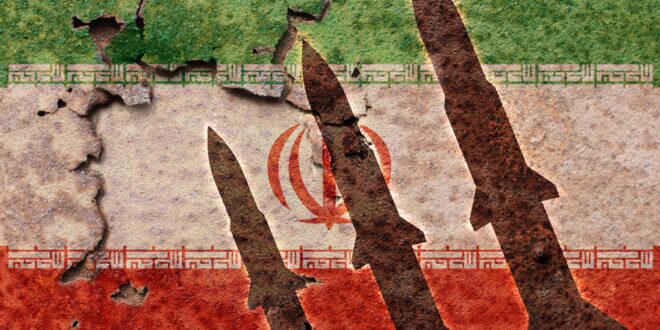Because of the apparent lack of oversight from world leaders, especially the United States, the rising provision of ballistic missiles by Iran to non-state actors –including terrorist and militia groups, as well as rogue states — now presents a significant source of concern for global security.
The regime continues to hide behind its proxies, Hamas, Hezbollah and the Houthis. Those are Iran’s human shields. That is why they have proxies in the first place: then it is the proxies doing the dirty work and being attacked, not Iran.
Unfortunately, unless Iran’s leaders themselves feel seriously disrupted, why would they ever stop? The Obama and Biden administrations tried giving Iran billions of dollars in “carrots.” Clearly that was a flop. The answer, all the same, is not: “Maybe there weren’t enough carrots. So next time, we will give more of them!”
To stabilize the Middle East, it is essential to apply ongoing pressure on the Iranian leaders themselves, to disrupt their accelerating programs to produce nuclear weapons and the missiles to deliver them, and to convince them, the old-fashioned way, that their hegemonic dreams of taking over the Middle East simply will not work.
The period of the Biden administration’s leadership has witnessed notable strides in Iran’s ballistic missile capabilities. These encompass advances in range, accuracy and payload capacity. Because of the apparent lack of oversight from world leaders, especially the United States, the rising provision of ballistic missiles by Iran to non-state actors –including terrorist and militia groups, as well as rogue states — now presents a significant source of concern for global security.
One of the key but lesser-known reasons behind the immense expansion of Iran’s ballistic missile program in the last few years can be attributed to the U.S. Treasury Department declaring in October 2021 the removal of sanctions on Iran’s Mammut Industrial Group and its subsidiary, Mammut Diesel. These companies had previously faced sanctions imposed by the Trump administration in September 2020 due to their identified roles as “key producers and suppliers of military-grade, dual-use goods for Iran’s missile programs.”
The expansion of Iran’s ballistic missile program can also be attributed to various policies of the Biden administration, such as the infusion of billions of dollars into the Iranian treasury, overlooking Tehran’s destabilizing actions in the region, and a lack of robust enforcement of sanctions, among other factors.
As of now, Iran has the Middle East’s largest ballistic missile arsenal. Iran is the only country to have acquired long-range ballistic missiles before possessing nuclear weapons. This unique characteristic raises concerns about the potential dual-use nature of these missiles. The Iranian regime appears to be developing sophisticated missiles primarily designed as delivery vehicles for nuclear weapons.
The missiles employed today in various conflicts can, generally speaking, be traced back to Iran. Notably, the missiles deployed by Yemen’s Houthis in targeting ships in the Red Sea have their roots in Iran. Similarly, the rockets and missiles used by Hezbollah and other groups, particularly those directed at Israel, have been supplied by Iran, showcasing the Iranian regime’s support for terrorist groups.
In 2016, Hossein Salami, who today is commander-in-chief of Iran’s Islamic Revolutionary Guard Corps (IRGC), told state-run IRIB television:
"Today, more than ever, there is fertile ground - with the grace of God - for the annihilation, the wiping out, and the collapse of the Zionist regime. In Lebanon alone, over 100,000 missiles are ready to be launched. If there is a will, if it serves [our] interests, and if the Zionist regime repeats its past mistakes due to its miscalculations, these missiles will pierce through space, and will strike at the heart of the Zionist regime. They will prepare the ground for its great collapse in the new era."Russia is now moving forward with plans to purchase ballistic missiles from Iran. The move would signify a notable intensification of Iran’s assistance to Russia. To date, Iran has also furnished Russia with “hundreds” of military drones to destroy Ukraine. Russia is reportedly buying 1,700 more such drones from Iran.
The Iranian regime has also been establishing weapons manufacturing facilities outside Iran’s borders, engaging in the production of advanced ballistic missiles and other weaponry in foreign countries, notably in Syria and Lebanon. Among the armaments being manufactured in these foreign facilities are precision-guided missiles, showcasing Iran’s utilization of cutting-edge technology to hit specific targets accurately. This expansion of Iran’s military-industrial capabilities beyond its borders allows the regime to conduct military operations or launch strikes on other nations indirectly through intermediary countries such as Syria, Lebanon, Yemen and Iraq.
The Biden administration seriously needs to sustain, fully enforce and broaden the scope of sanctions already in effect. Even more urgently, the Biden administration needs to target Iran’s ballistic missile program, and with it, the headquarters and military training bases of the Islamic Revolutionary Guard Corps. Iran’s regime uses these bases for both its own militias and for its proxies.
The regime continues to hide behind its proxies, Hamas, Hezbollah and the Houthis. Those are Iran’s human shields. That is why they have proxies in the first place: then it is the proxies doing the dirty work and being attacked, not Iran.
Unfortunately, unless Iran’s leaders themselves feel seriously disrupted, why would they ever stop? The Obama and Biden administrations tried giving Iran billions of dollars in “carrots.” Clearly that was a flop. The answer, all the same, is not: “Maybe there weren’t enough carrots. So next time, we will give more of them!”
To stabilize the Middle East, it is essential to apply ongoing pressure on the Iranian leaders themselves, to disrupt their accelerating programs to produce nuclear weapons and the missiles to deliver them, and to convince them, the old-fashioned way, that their hegemonic dreams of taking over the Middle East simply will not work.
 Eurasia Press & News
Eurasia Press & News



